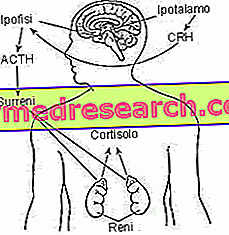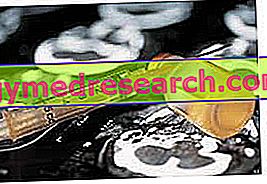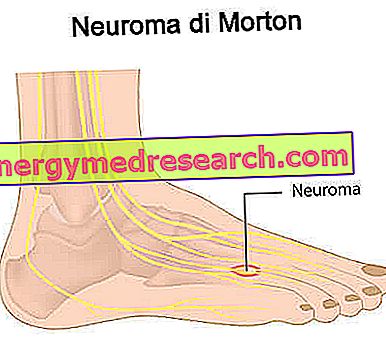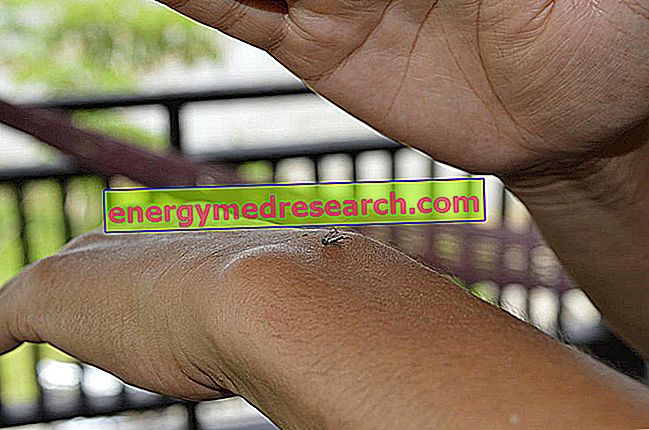Generality
ACTH is a polypeptide hormone produced in the pituitary gland (pituitary gland).
Its main function is to stimulate the secretion of other hormones, in particular glucocorticoids (including cortisol) by the adrenal glands (adrenal cortex).
In turn, glucocorticoids influence the metabolism of sugars and the formation of androgens.

The ACTH assay facilitates the differential diagnosis of pituitary and adrenal disorders, such as Cushing's syndrome, Addison's disease and some cancers.
What's this
Biological Role
ACTH, known as adrenocorticotropic hormone or corticotropin, is a 39-amino acid polypeptide, produced and secreted by corticotropic cells of the anterior pituitary.
At the level of the adrenal glands, ACTH stimulates the synthesis and secretion of corticosteroids, hormones derived from cholesterol and very important for the glycemic and immune balance of the body.
The secretion of ACTH (Adrenocorticotropic Hormone) is regulated by the hypothalamus and the plasma level of corticosteroids; it is therefore subject to a double check:
- On the one hand it is stimulated by the hypothalamic factor CRH (Corticotropin Releasing Hormone);
- On the other hand it is inhibited by the adrenal hormones that ACTH itself helps to produce.
Conversely, the drop in adrenal hormones causes an increase in ACTH, which in turn stimulates the endocrine secretion of the adrenal cortex.
Thus a perfect negative feedback circuit is created, for which in the healthy subject ACTH increases when cortisol is low and decreases when it is high.
The pituitary synthesis of ACTH occurs starting from a precoritator protein called Pro-opiomelancortin (in turn derived from the Pre-pro-opiomelancortin), which after undergoing a series of post-translational modifications, undergoes a series of proteolytic cuts from which give rise to several peptide fragments. Among these, besides the ACTH, we recall the hormone melanocitostimulante (MSH), which favors the bronze coloring of the skin, the β-lipotropin and the γ-lipotropin.
Generally, the ACTH blood concentration is higher in the morning and lower in the night. In fact, the synthesis and release of this hormone does not occur continuously, but intermittently, with a fairly regular cyclical pattern during the various days ( circadian secretion ). More specifically, in relation to the sleep-wake cycle, the plasma level of ACTH and cortisol is maximum in the early hours of the morning (8 hours) and minimum at 24.
ACTH acts at the level of the adrenal cortex (the most external part of the adrenal glands), stimulating its endocrine activity (biosynthesis and hormonal secretion). Among the most important adrenal cortical hormones secreted under the stimulus of ACTH stands out cortisol, a very important hormone in the body's processes of adaptation to physical and / or psychological stress; much less is the stimulatory activity of ACTH on aldosterone synthesis.
Cortisol is important in regulating the metabolism of glucose, proteins and lipids, in suppressing the immune system and maintaining blood pressure.
Why do you measure
Given its leading biological role, blood ACTH levels are measured to facilitate diagnosis and monitor certain morbid conditions associated with excess or cortisol defect:
- Symptoms related to an excess of cortisol :
- Obesity, with most of the adipose tissue concentrated at the trunk and full moon facies; fragile and thin skin, which breaks easily;
- Amenorrhea;
- Infertility.
- Symptoms related to a cortisol defect :
- Muscle weakness;
- Easy fatigue;
- Weight loss and appetite loss;
- Depression;
- Anorexia;
- Dark skin (appears tanned);
- Low pressure;
- Nausea;
- He retched;
- Diarrhea;
- Desire for salty food;
- Low libido, especially in women.
When is the exam prescribed?

These include:
- Cushing's disease : a condition characterized by hyper-stimulation of the adrenal glands by ACTH, whose high levels are secondary to the presence of a tumor (generally benign) of the pituitary gland.
- Cushing syndrome : the signs and symptoms of this disease are due to excess cortisol. Compared to Cushing's disease, the causes can be different and include: tumors of the adrenal glands, adrenal hyperplasia (increased growth of adrenal cells), intake of steroid hormones (often used in the treatment of cancer and autoimmune diseases) or non-pituitary neoplasms ( generally of the lung) that produce ACTH.
- Addison's disease : the shortage of cortisol and other steroids (including aldosterone) is caused by damage to the adrenal glands (primary adrenal insufficiency);
- Secondary adrenal insufficiency : the reduced production of cortisol is due to pituitary dysfunction;
- Hypopituitarism : dysfunction or pituitary damage leads to decreased hormonal production by the pituitary gland, including that of ACTH.
Measuring both ACTH and cortisol is useful in the differential diagnosis of these diseases, since the levels of the first hormone vary inversely with respect to the levels of the second. Other tests such as dexamethasone suppression and blood collection from the inferior petrosal sinus can further help the doctor in the distinction.
Normal values
The reference values for ACTH are in the range 0 - 46 pg / ml
Note : the reference interval of the exam can change according to age, sex and instrumentation used in the analysis laboratory. For this reason, it is preferable to consult the ranges listed directly on the report. It should also be remembered that the results of the analyzes must be assessed as a whole by the general practitioner who knows the patient's medical history.
ACTH High - Causes
- Pregnancy;
- Hypoglycemia;
- Strong psycho-physical stress (anxiety in view of blood sampling, severe trauma or surgery);
- Endocrine diseases such as Addison's disease (primary adrenal insufficiency);
- Cushing ACTH dependent syndrome;
- Removal of the adrenal glands;
- ACTH secreting ectopic tumor.
Some drugs, including insulin, amphetamines, levodopa, metoclopramide and RU486, can induce high ACTH values.
Disease | Cortisol | ACTH |
Cushing's disease (ACTH secreting pituitary tumor) | High | High |
Adrenal tumor | High | Bass |
Ectopic secretion of ACTH due to non-pituitary (usually pulmonary) tumors | High | High |
Addison's disease (adrenal damage) | Bass | High |
Pituitary insufficiency (hypopituitarism) | Bass | Bass |
ACTH Low - Causes
Adenoma and adrenal cancer;
- Pituitary insufficiency;
- Senile age;
- Current therapy with corticosteroids;
- Cushing syndrome related to adrenal cancer;
- Ectopic Cushing syndrome (non-pituitary tumors that secrete ACTH);
- Iatrogenic Cushing syndrome (excess of corticosteroids).
The drugs that induce a reduction in ACTH levels are dexamethasone, cortisonics (including prednisone, hydrocortisone, prednisolone and methylprednisolone) and megestrol acetate.
How to measure it
To measure ACTH levels, the patient must have blood drawn from a vein in his arm. Usually, the sample is collected in the morning, at about 8 am, after fasting overnight.
To remember - Adrenocorticotropic hormone levels have a significant circadian rhythm (lower levels are recorded between 21 and 22, while higher values are observed between 6 and 8). For this reason, it is important to standardize the picking time.
Preparation
Before undergoing the sample for the determination of the adrenocorticotropic hormone, it is necessary to observe a fast of at least 8 hours. During this period, a small amount of water can be taken. Furthermore, before the exam, you must be in an upright position for at least 30 minutes.
Those who have to undergo the ACTH procedure must stop the drugs that can affect the values (eg cortisone or estrogen) 72 hours before the exam. Furthermore, intense physical activity must be suspended during the 24 hours preceding the withdrawal.
Interpretation of Results
Blood ACTH levels are measured to facilitate diagnosis and monitor some pathological conditions associated with excess or lack of cortisol in the body.
- An increased concentration may indicate the presence of Cushing's disease, Addison's disease (adrenal damage) or ectopic production of ACTH (the latter is produced by the tumor outside the pituitary gland, normally in the lung).
- A decreased level of the hormone, on the other hand, may be related to adrenal cancer, steroid medication or hypopituitarism.



